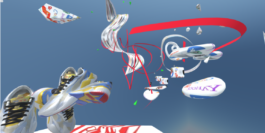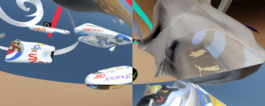Privacy Poetry: Un-conscious indicators and in-dependent identities
2023: Essay und VR Installation "Privacy Poetry" für 34.Mag.sk
The new currency of immersive capitalism is biodata.
The amount of data that companies providing “free” internet services have accumulated about us is immense, and with advancing technology (not only virtual and augmented reality, but also the internet of things, smart households, medical sensors, etc.) it will only continue to grow. Nobody reads the terms of use, and it is not even expected that people will read them, much less fully comprehend their implications. This small project attempts to bring them to the centre of (audio) attention, and this introductory text aims to explore at least some of their implications.
As technological systems, virtual and augmented reality have become objects of our attention, but they are capable of monitoring us at the same time. They constitute a recursive panopticon. Furthermore, data from sensors are fed with personal information that we agree to share as soon as we accept the device’s license agreement. If we want to use them, we don’t really have a choice, as there is no working open-source software, much less hardware, for virtual and augmented reality. Other data is gathered while the technology is in use. Not that this is anything new, considering just how much data is collected by our smartphones, which many of us couldn’t imagine being without. The only novelty here is the scale of surveillance of our digital identities and real bodies.
Considering just how much contemporary technologies determine our way of life in society at large, in the upcoming epoch of the cognitive unconscious (see K. Hayes, 2017) the concept of the subject of knowledge will be that much more important. This subject will need to be able to recognise not only human beings, but also nature (as a category that remains suspended) and technical devices (as the fastest-growing component of society able to influence its further development) as parts of oneself.
Before we pump even more data into the internet of the future – a possible metaverse of virtual and augmented reality – we must answer some pressing questions about the possibilities and regulatory models for data management.
Privacy Poetry: Un-conscious indicators and in-dependent identities
2023: Essay und VR Installation "Privacy Poetry" für 34.Mag.sk
The new currency of immersive capitalism is biodata.
The amount of data that companies providing “free” internet services have accumulated about us is immense, and with advancing technology (not only virtual and augmented reality, but also the internet of things, smart households, medical sensors, etc.) it will only continue to grow. Nobody reads the terms of use, and it is not even expected that people will read them, much less fully comprehend their implications. This small project attempts to bring them to the centre of (audio) attention, and this introductory text aims to explore at least some of their implications.
As technological systems, virtual and augmented reality have become objects of our attention, but they are capable of monitoring us at the same time. They constitute a recursive panopticon. Furthermore, data from sensors are fed with personal information that we agree to share as soon as we accept the device’s license agreement. If we want to use them, we don’t really have a choice, as there is no working open-source software, much less hardware, for virtual and augmented reality. Other data is gathered while the technology is in use. Not that this is anything new, considering just how much data is collected by our smartphones, which many of us couldn’t imagine being without. The only novelty here is the scale of surveillance of our digital identities and real bodies.
Considering just how much contemporary technologies determine our way of life in society at large, in the upcoming epoch of the cognitive unconscious (see K. Hayes, 2017) the concept of the subject of knowledge will be that much more important. This subject will need to be able to recognise not only human beings, but also nature (as a category that remains suspended) and technical devices (as the fastest-growing component of society able to influence its further development) as parts of oneself.
Before we pump even more data into the internet of the future – a possible metaverse of virtual and augmented reality – we must answer some pressing questions about the possibilities and regulatory models for data management.

